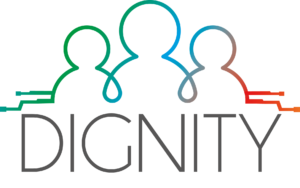Would you like to learn more about inclusive mobility? Here you can find links to national and international R&I activities linked to DIGNITY, along with other helpful resources.
Young people constitute an important group of public transport users and will inherit the outcomes of all key decisions made today. Youth For Public Transport is an international non-governmental youth organisation (NGO) that promotes the active participation of young people in advocating sustainable mobility at all levels and in all settings. It does so by promoting the integrated use of public transport with other means of transport, in order to achieve greater well-being and a better quality of life for people all around the world. Y4PT organizes hackathons and ideathons on a global scale with its local partners to challenge young professionals.
The MIND-SETS project provided a new approach to understanding mobility as part of the overall changing lifestyles of different population groups across Europe. It assessed how we could better understand mobility at the level of lifestyle patterns, set against social/economic/technological trends: in short – what are people’s mobility mind-sets across Europe? This involved a new approach that brought mainstream sociologists, environmental psychologists and economists together with sustainable mobility and travel behaviour specialists as well as experts in social, technological and ICT trends: a full multi-disciplinary, new type of team to assess mobility issues, in the hopes of changing the professional mind-set of mobility stakeholders.
The TtIR project is funded by the UK government through the RSSB (the UK’s Railway Standards and Safety body) through their Train Operating Companies call in 2016, with its partners, Siemens Mobility, Keolis Amey Docklands, Astutim and the University of Cambridge. It addresses challenges with railway travel for older people and those with vision, hearing, thinking, reach, stretch and dexterity impairments. The project aims to apply innovative new tools and techniques to understand and quantify the difficulties these people encounter and to devise digital interventions that will reduce barriers to travel, enabling more people to live independently.
INCLUSION is a three-year European project that kicked off in October 2017. The main objective of the project is to understand, assess and evaluate the accessibility and inclusiveness of transport solutions in prioritised areas in Europe. The project is identifying gaps and needs in order to propose and experiment with a range of innovative and transferable solutions. INCLUSION’s innovative mobility solutions are being tested in six pilot labs aimed at transferring best practice approaches across Europe: Rhein-Sieg (Germany); Florence Metropolitan Area (Italy); Cairngorms National Park (the UK); Flanders (Belgium); Barcelona conurbation (Spain); and Budapest (Hungary).
With urbanisation happening faster than expected due to migration, demographic change and economic interest, and with many European cities setting ambitious climate targets to fulfil the goals of the Paris Agreement, there is a real need to invest in up‐to‐date urban transport systems. EIT Urban Mobility is a consortium of 48 partners from 15 countries, including the cities of Copenhagen, Eindhoven, Prague and Istanbul, Polytechnic University of Catalonia, Israel Institute of Technology, SEAT, École Polytechnique Fédérale de Lausanne, and Volkswagen Truck & Bus, that will help ensure a greener, more inclusive, safer and smarter urban mobility system.
The DIAMOND project analyses and converts data into knowledge to support gender inclusion in current and future transport systems, taking the perspective of women as transport users and as professionals in the sector. The project makes use of data mining and analytics in order to identify, design and evaluate specific measurements for fulfilling women’s needs and expectations in the transport sector. The knowledge gathered is to be fed into a self-diagnosis tool, a practical decision support system and for the production of diverse materials, and will lead to recommendations on how to achieve gender inclusiveness in different scenarios and promote female employment in the sector.
TInnGO (Transport Innovation Gender Observatory) is a three-year research project funded in the context of the EU’s HORIZON 2020 Programme, aiming to create a framework and mechanisms for a sustainable game change in European transport through a transformative strategy of gender- and diversity-sensitive smart mobility. It explores transport as not just a means of physically moving people from one point to another, but also as a potential means towards the creation of gender equality. It aims to create awareness and action plans, which can be translated into different cultural contexts to develop gender- and diversity-sensitive smart mobility as a fundamental component of a smart city.
Every design decision has the potential to include or exclude customers. Inclusive design emphasizes the contribution that understanding user diversity makes to informing these decisions, and thus to including as many people as possible. User diversity covers variation in capabilities, needs and aspirations. Cambridge University offers a set of inclusive design tools and guidelines that can be used to ensure accessibility. The Inclusive Design Wheel was developed by the Engineering Design Centre at the University of Cambridge as part of the Inclusive Design Toolkit. The wheel represents a concept design process that can be used to design inclusive products and services.
The INDIMO project involves 15 partners across Europe that have a shared interest in accessibility and inclusion in future transport. It focuses on improving understanding of user needs and providing tools and policy recommendations that address challenges regarding access to digital mobility and logistics services, which may be limited due to physical, cognitive, socio-economic and spatial barriers; the communication needs of people from different countries, cultures and languages, given that digital mobility is becoming increasingly international, and the increased risk of cyber threats, which may have an impact on operations as well as on the privacy, health and safety of citizens.











